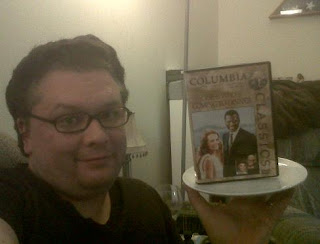
If you know anything about me you know race relations and civil rights are kinda my “thing.”
Part of me feels like my viewing experience of this movie, centered around the varying reactions of the families and friends of a mixed-race couple who are planning to get married, will always be diminished by the fact that I don’t get the full “shock value” that must have come with it in 1967. However, I live in Spokane Washington, and I see how people here STILL react to interracial unions, so I kind of feel like 2010 Spokane is like, say 1967 San Francisco.
I know that this movie could not have plausibly been made if certain parts of the narrative had been TOO extreme, for instance, if the white girl had brought a black fiancé home to Alabama to meet her chronically unemployed parents and had to persuade them over the course of a two-hour movie that they should give their blessing to their marriage, it would have been absurd outside of the context of a Disney film. For this reason, “Guess Who’s Coming To Dinner” is a little disappointing, since the parents have, according to the Katharine Hepburn character, raised their daughter to know that all people are the same, so why would it be such a big deal for her to be marrying a black man if her own parents are Civil Rights supporters?
Therein lies the true artistry of the film. It makes you reexamine your prejudices and think to yourself “would I be so tolerant if I were in the same position?” Obviously for some people that is an easier question to answer than it is for others, but that is truly clever storytelling. Character development is unrealistic and corny if it is TOO much of a stretch, and this movie had the perfect balance of that. Also, I have no doubt that at the time this movie was released it was largely preaching to the choir.
"There'll be 100 million people right here in this country who will be shocked and offended and appalled and the two of you will just have to ride that out, maybe every day for the rest of your lives. You could try to ignore those people, or you could feel sorry for them and for their prejudice and their bigotry and their blind hatred and stupid fears, but where necessary you'll just have to cling tight to each other and say 'screw all those people!'" (Matt Drayton, "Guess Who's Coming To Dinner"
For all the great advancements this movie made and for all the ground it broke, there is one thing that bothered me incessantly about it when I observe it through the filter of time. While we don’t get much time to get to know Sidney Poitier’s mother in the movie, it is made very clear that Katharine Hepburn is, well Katharine Hepburn, she is a strong, stubborn and opinionated career woman (who also pulls off one of the greatest “HELL YEAH!” moments in cinema in the scene where she calmly and subtly fires an obnoxiously racist employee) yet she still has a very Stepford Wife gender role in this film. It may have been sleight of hand, or it may have even gone unnoticed at the time, but the roles of both mothers still have to take a backseat to their husbands. The two scenes that depict this the most are:
1) When Katharine Hepburn’s character tearfully confides in the family friend/Priest she is distraught that her husband is about to tell the hopeful couple that he will not give his blessing to the marriage. Her approval of the union is seemingly completely irrelevant and she doesn’t even make a whole-hearted effort to state her case to him, rather she submissively cries and slinks off after he voices his disapproval.
2) After all the parents have had a chance to converse without their children it is made clear that both sets of mothers want to see the marriage go ahead and both fathers do not. When Sidney Poitier’s mother informs him of this, he is shocked to learn that, just because the girl’s father is against the marriage, her mother isn’t. Also, by having both mothers be in favor of the union rather than one mother and one father for example, it kind of inadvertently gives the impression that women are so lovesick and romantic that only the men are being practical and raising concerns about a hasty, controversial marriage.
For as much as I looked forward to watching such an envelope-pushing movie, it wasn’t everything I hoped it would be. That’s not to say it was a bad movie, it was a fantastic movie, but I just don’t feel like it crammed racial equality down the audience’s throat as much as it should have, of course, this is coming from someone with a very overstated racial agenda in life, so in defense of this movie, nothing would have completely satisfied me short of Sidney Poitier shouting at Spencer Tracy “Look cracker, I’m marrying your daughter like it or not!” But that would have made for an awfully short movie in addition to probably setting back the portrayals of African American characters to the time of Al Jolson Blackface performances.
I've seen this, and I'd have to say all your points are dead on. However we have to remember in 1967 a movie that pressed forward both equal rights for minorities AND women, would've most likely been received as too extremist and pushing the envelope too far.
ReplyDeleteYeah thats true, to be honest I have a bad feeling in the pit of my stomach that this movie had enough hurdles to clear as it was
ReplyDelete